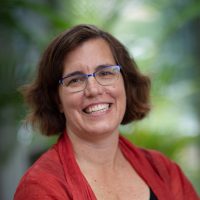Q&A with Suzanne Maman, PhD, Associate Dean for Global Health
What does it mean to be the Associate Dean for Global Health?

Dr. Suzanne Maman
It means that I support all global research and curriculum activities in the school. This includes supporting strategic global partnership sites and promoting and identifying opportunities for global leadership among our students and faculty. I see my role as supporting faculty and students working in global health to launch new initiatives and support ongoing initiatives.
What moments or people first sparked your interest in public health?
As an undergraduate at Cornell I thought I was going to pursue a career in social work, but I quickly realized I did not want to work in a clinical setting, one on one with individuals. My undergraduate advisor knew I was interested in working at the community or population level and she suggested I consider public health. I knew nothing about the field of public health at the time, so I went out to gain some experience. I found a job supporting a USAID-funded health project in Senegal. Working on that project gave me an orientation to the field of global health and convinced me that I needed more training, so I returned to school for my Masters and then PhD in public health.
What does “global health” mean to you?
I define global health broadly as research and practice that is focused on improving health and achieving equity in health for all people worldwide. It emphasizes transnational health issues, determinants and solutions and it is multidisciplinary by nature.
What are your hopes for the future of global health at Gillings?
Under the direction of outgoing Associate Dean for Global Health, Peggy Bentley, our school has grown substantially in terms of our research and curriculum in global health. In this next phase, under my direction, we can begin to deepen our work in global health in a few strategic and innovative areas. There are a number of directions we can take to strengthen and build global health at Gillings. I will work with global health leaders at Gillings, on campus, and in our partnership sites to identify the areas we want to prioritize.
This is an interesting time to be transitioning into the role of Associate Dean for Global Health given COVID and the national and transnational movements related to racial equity that have come in to sharp focus this summer. COVID has thrown us all for a loop, particularly our students and faculty working in global health. We have been challenged to find new ways to engage in our global health research and practice. We will need time when we emerge from this pandemic to take stock and figure out how we should move forward with our global health work. Finally, this summer has highlighted the importance of the Black Lives Matter movement in addressing racial injustices in the US. I want to leverage this momentum to find effective ways for our students and faculty to engage in the racial equity discussions and actions in the field of global health.
What is something most people don’t know about you?
I am a mother of three children between the ages of 8 years and 19 years. My kids bring balance to my work, and my career provides me with perspective that makes me a better parent. I have a wonderful, supportive network of friends who are also balancing work and family. These friendships have helped me remember not take things too seriously, and to find the joy in small things along the way.
What advice do you have for current students of global health?
We are living through such a tumultuous time. It is difficult to see you (our students) launching your careers in the midst of such uncertainty. I hope you know that this time, more than ever, we need smart, committed public health professionals to get us through the challenges ahead. You have made a great career choice. There are many directions you can take your training in global health, and many ways you can contribute to the solutions. Finally, don’t forget that when you leave UNC please stay connected! We benefit in so many ways from the amazing work that our alumni are doing in the field. We want you to stay connected and to give back to the future generations of trainees.
